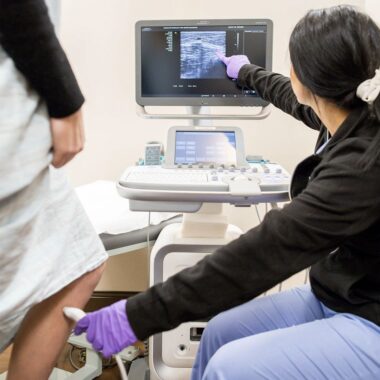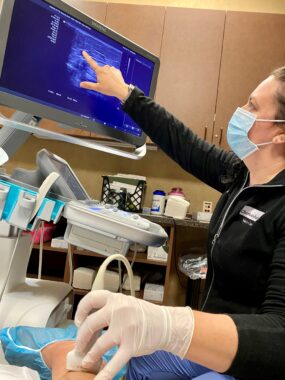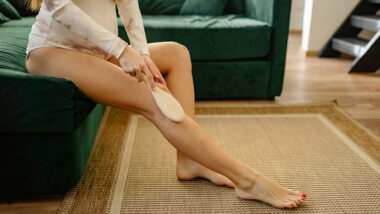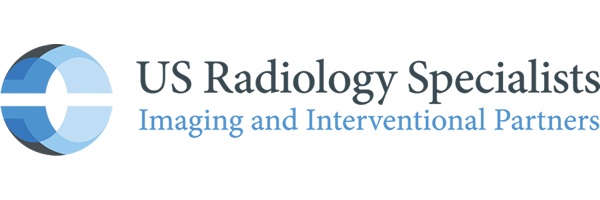The oldest millennials are now entering their 40s. This shift means that common health problems of middle age, such as varicose veins, are on the horizon for many in this generation. However, even the youngest millennial, who is now approaching their 30s, could also be at risk for poor vein health or vein issues. Addressing vein concerns early on with help from the vein specialists at Charlotte Radiology is your key to unlocking improved venous health.
Understanding Vein Health
Along with your arteries, your veins are blood vessels that carry your blood throughout your body. Arteries take oxygen-rich blood away from the heart to your organs, bones and muscles so they can function. Veins carry the now oxygen-depleted blood back to your heart, so it can refresh it with oxygen from your lungs.
When our leg veins are not functioning well, blood is not smoothly returned toward the heart and can pool in our legs, which is called venous insufficiency. This can lead to vein conditions, including:
- Deep vein thrombosis (DVT), blood clots in your veins
- Spider veins, visible veins on the surface of your skin
- Varicose veins, swollen, twisted and often painful veins in your legs
- Venous insufficiency, blood pooling in your legs that can lead to serious complications
Read More: Choosing the Right Vein Specialist: Your Partner in Vascular Health
Why Millennials Are at Risk for Vein Problems
As the millennial generation continues to age, they face a unique set of vein health challenges. While vein issues are typically associated with older age, several factors make millennials particularly susceptible. Understanding these risk factors is the first step toward prevention and early intervention. The most common risk factors for varicose veins include:
- Being overweight/obese
- Having a job where you sit or stand for long periods
- Family history
- Lack of exercise
- Pregnancy
- Some types of strenuous exercise
- Smoking
- Using hormonal birth control or hormone replacement therapy
Signs and Symptoms to Watch For
If you think you could be at risk of developing varicose veins, it’s important to recognize the early signs of vein health issues.
You may see visible blue, purple or red veins on the surface of the skin. They may look like small spider webs or branches (spider veins) or bulging, ropey blood vessels (varicose veins). Your legs are the most common place for these to appear, but they can also show up on your face or hips. Other symptoms include leg cramps (especially at night), swelling in your legs or feet, or itching, throbbing or achy legs.
Often, these symptoms will worsen after standing or sitting for a while but will usually improve with rest. If you notice any sores or bleeding on your legs, you should contact a medical provider promptly.
Preventative Measures and Lifestyle Changes
Varicose veins and other health issues are not always preventable. Young, healthy people can develop spider or varicose veins in their 20s and 30s, and many women with healthy pregnancies will develop them. But you can take steps to lower the risk of varicose veins and improve your overall vein health, including:
- Eating a heart-healthy diet
- Getting plenty of exercise
- Limiting alcohol consumption and staying hydrated
- Quitting smoking
- Taking frequent breaks if your job requires sitting or standing all day
- Wearing compression socks or hosiery to reduce pooling of venous blood in your legs
Read More: Could Your Job Be a Cause of Varicose Veins?
Treatment Options for Vein Health Issues
Treating varicose veins in your legs can prevent long-term complications. There are several minimally invasive non-surgical varicose vein treatment options, including:
- Sclerotherapy, in which a chemical is injected into the spider or varicose vein to seal it
- Endovenous laser therapy, in which an ultrasound-guided laser closes off the problem vein
These convenient outpatient procedures are safe and effective. Our Vein Specialists at Charlotte Radiology can help you choose the right treatment option and help you manage your vein health.
The Importance of Early Intervention
Treating vein conditions before they worsen is crucial for millennial health. Treatment can reduce leg heaviness, and tiredness, allowing you to work, exercise, and enjoy time with your family and friends with less discomfort. Early treatment can reduce the risk of progressing to more advanced vein disease complications, such as chronic skin changes, poorly healing ulcers or blood clots along your legs. Charlotte Radiology’s vein specialists are experienced in treating vein disease at the source. Take action for a healthy future and healthy legs by scheduling a consultation with us.



